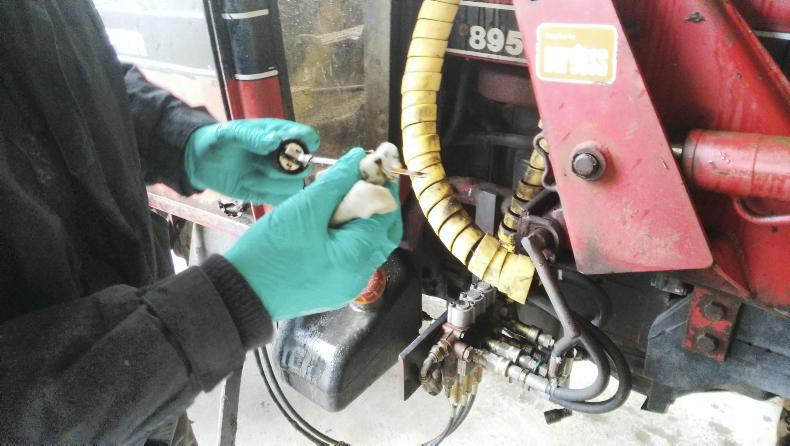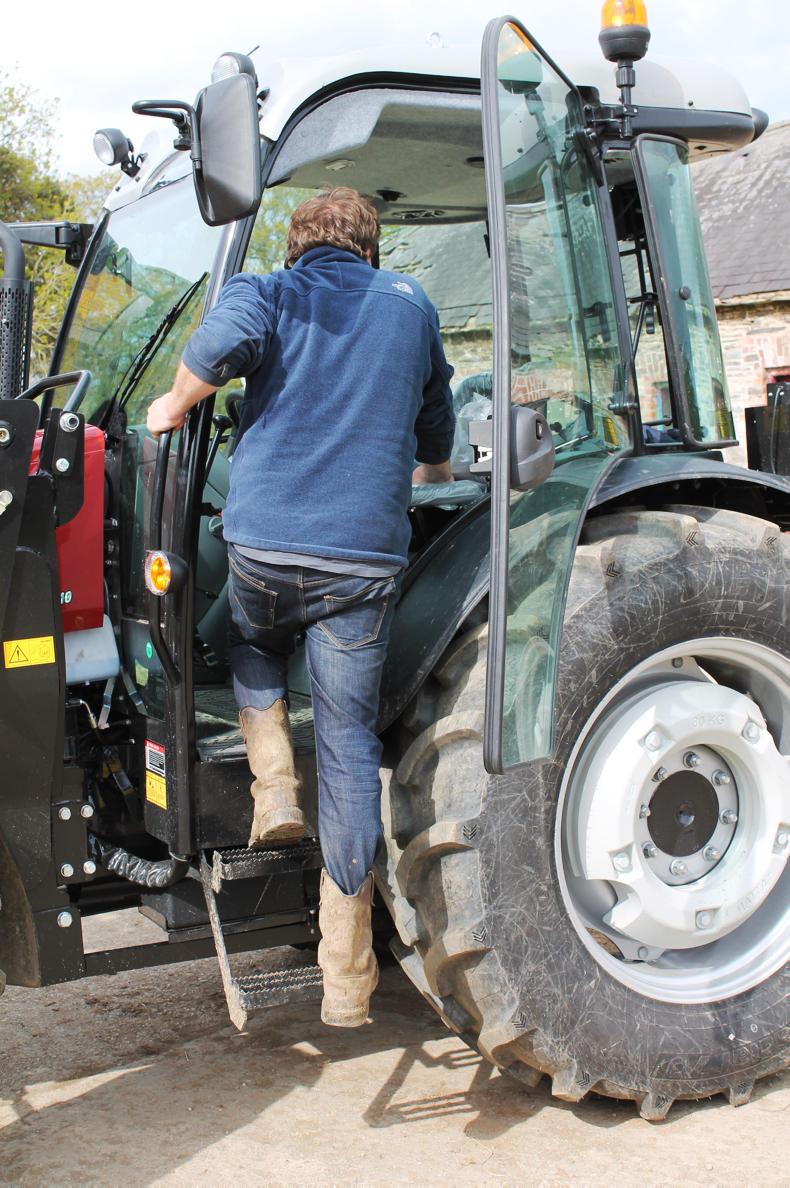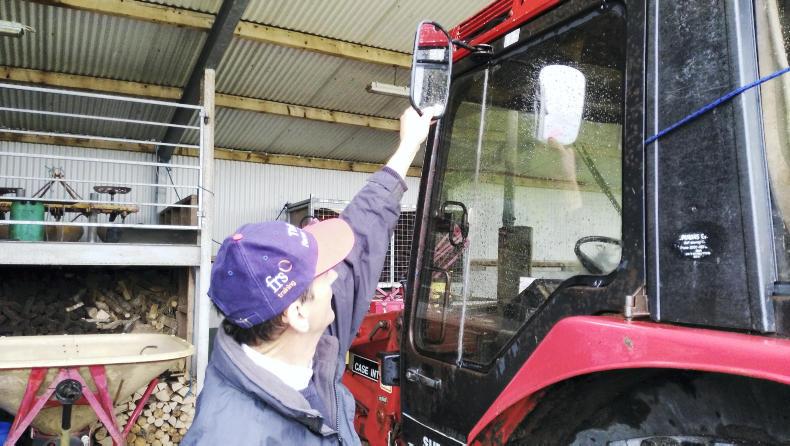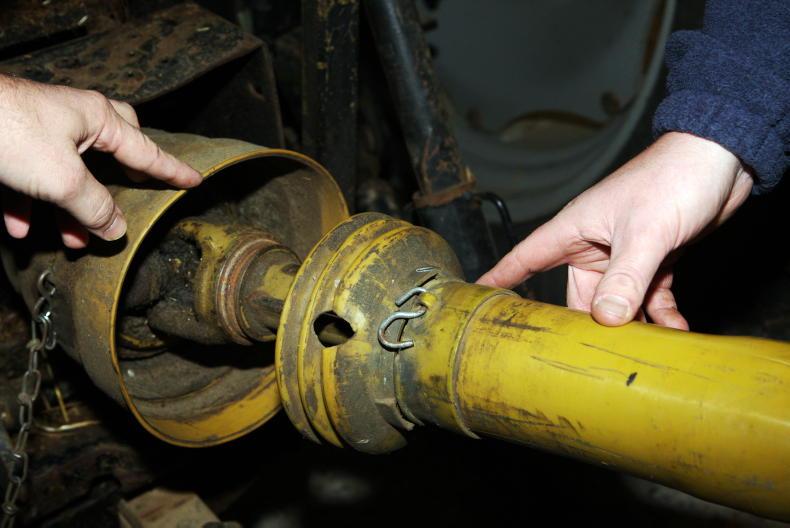With the silage season now in full swing, all farmers and contractors are under huge amounts of pressure during the short spells of fine weather. It is vital that every machine operator takes the time and care required to get the job done as safely as possible.
According to the Health and Safety Authority (HSA), farm vehicles and machinery account for the highest proportion (27%) of farm deaths and accidents. People at risk include vehicle or machine operators and others in the vicinity.
Visibility
It is not uncommon to have to work into the darkness at this time of the year, especially with the recent mixed spells of weather. A complete set of fully functional working lights and road lights is essential for ease of operation and for the safety of all road users. Tractors with implements travelling on public roads should be equipped with a flashing amber beacon to alert oncoming drivers.

It is important that tractors have working wipers and mirrors with no cracks. Impaired operator vision can lead to serious mishaps. Before taking off with a tractor, you should always look around you to make sure there is no one in the vicinity of the machine.
Maintenance
Simple maintenance of tractors such as regularly cleaning out the cab floor to allow the safe use of brakes and the clutch can significantly reduce the possibility of incidents. The vehicle controls should all be in working order and clearly marked. A tidy cab allows safe and easy use of the controls.
 According to the HSA, a cab or safety frame to OECD (Organisation for Economic Co-operation and Development) standards must be fitted. The HSA advises farmers to look for corrosion on frames of older tractors which may weaken its overall strength. Operators should ensure that the tractor can be started by the key and that the engine-stop control is working. The driver should also check all instruments and controls for functionality and operation.
According to the HSA, a cab or safety frame to OECD (Organisation for Economic Co-operation and Development) standards must be fitted. The HSA advises farmers to look for corrosion on frames of older tractors which may weaken its overall strength. Operators should ensure that the tractor can be started by the key and that the engine-stop control is working. The driver should also check all instruments and controls for functionality and operation.
Brakes should be inspected on a regular basis and should be kept in good working condition. A fully functioning handbrake is vital. Rolling over, getting trapped and crushing accidents accounted for 56% of tractor and machinery related accidents from 2007 to 2016.
Implements
It is essential that operators take the time required to properly attach and dismount implements from their tractor. Hitch points such as the pick-up on the tractor and the eye hitch on a trailer should be regularly inspected for any wear and tear. When attaching implements with a power take-off (PTO) shaft, it is vital that a functioning guard covers the shaft and that there is a working u-guard on the tractor. When the PTO shaft is attached on to the tractor the operator should inspect if it can be turned on and off correctly before putting it to work.
Hydraulic hoses should be examined before being attached to a tractor. Any damaged pipes or couplings should be repaired or replaced before being used. The HSA warns operators to never place a finger near any leak in a hydraulic hose pipe. This is likely to cause infection and possibly the loss of a limb. The HSA recommends to seek immediate medical assistance if even the smallest amount of oil is forced under the skin.
Operator awareness
 It is vital the machine operator is fully aware of their load and of the machine’s capabilities. The operator should be capable and confident. Drivers who are untrained with little experience are a hazard. It is vital that these operators receive the correct training and instructions before operating any machinery.
It is vital the machine operator is fully aware of their load and of the machine’s capabilities. The operator should be capable and confident. Drivers who are untrained with little experience are a hazard. It is vital that these operators receive the correct training and instructions before operating any machinery.
Simple advice such as entering a tractor correctly can help to avoid trips and falls. Operators should enter and exit a tractor in the same fashion. This is climbing up the steps while holding on to the guide rails and facing the tractor. When possible, the guidance in the operator’s manual should be followed and the tractor should be operated in a safe manner. The bottom line is to remember, you must always treat the tractor with respect, and keep a watchful eye for the safety of yourself and others while operating.
Driving tractors on slopes can be a very dangerous task. Operators must carefully consider if it is worth the risk of operating machinery on sloping ground. They must also assess the risk of overturning. It is essential that you always assess the slope and ground conditions before commencing any work.
The HSA recommends that operators make sure they are familiar with the slope and to walk the slope before driving on it. Simple advice while working on sloping ground is to use a four wheel drive tractor. Operators should select the right gear before climbing the slope. It is vital that you avoid any gear changes on a slope. Drivers should avoid any quick or sharp turns as this can lead to overturning. The HSA advises operators that if a tractor is about to overturn, do not attempt to jump clear. Stay in the cab and hold on to the steering wheel.
Another point of danger to watch out for is overhead electricity poles and wires because this really could save your life.
Read more
Special focus: tractors 2017

With the silage season now in full swing, all farmers and contractors are under huge amounts of pressure during the short spells of fine weather. It is vital that every machine operator takes the time and care required to get the job done as safely as possible.
According to the Health and Safety Authority (HSA), farm vehicles and machinery account for the highest proportion (27%) of farm deaths and accidents. People at risk include vehicle or machine operators and others in the vicinity.
Visibility
It is not uncommon to have to work into the darkness at this time of the year, especially with the recent mixed spells of weather. A complete set of fully functional working lights and road lights is essential for ease of operation and for the safety of all road users. Tractors with implements travelling on public roads should be equipped with a flashing amber beacon to alert oncoming drivers.

It is important that tractors have working wipers and mirrors with no cracks. Impaired operator vision can lead to serious mishaps. Before taking off with a tractor, you should always look around you to make sure there is no one in the vicinity of the machine.
Maintenance
Simple maintenance of tractors such as regularly cleaning out the cab floor to allow the safe use of brakes and the clutch can significantly reduce the possibility of incidents. The vehicle controls should all be in working order and clearly marked. A tidy cab allows safe and easy use of the controls.
 According to the HSA, a cab or safety frame to OECD (Organisation for Economic Co-operation and Development) standards must be fitted. The HSA advises farmers to look for corrosion on frames of older tractors which may weaken its overall strength. Operators should ensure that the tractor can be started by the key and that the engine-stop control is working. The driver should also check all instruments and controls for functionality and operation.
According to the HSA, a cab or safety frame to OECD (Organisation for Economic Co-operation and Development) standards must be fitted. The HSA advises farmers to look for corrosion on frames of older tractors which may weaken its overall strength. Operators should ensure that the tractor can be started by the key and that the engine-stop control is working. The driver should also check all instruments and controls for functionality and operation.
Brakes should be inspected on a regular basis and should be kept in good working condition. A fully functioning handbrake is vital. Rolling over, getting trapped and crushing accidents accounted for 56% of tractor and machinery related accidents from 2007 to 2016.
Implements
It is essential that operators take the time required to properly attach and dismount implements from their tractor. Hitch points such as the pick-up on the tractor and the eye hitch on a trailer should be regularly inspected for any wear and tear. When attaching implements with a power take-off (PTO) shaft, it is vital that a functioning guard covers the shaft and that there is a working u-guard on the tractor. When the PTO shaft is attached on to the tractor the operator should inspect if it can be turned on and off correctly before putting it to work.
Hydraulic hoses should be examined before being attached to a tractor. Any damaged pipes or couplings should be repaired or replaced before being used. The HSA warns operators to never place a finger near any leak in a hydraulic hose pipe. This is likely to cause infection and possibly the loss of a limb. The HSA recommends to seek immediate medical assistance if even the smallest amount of oil is forced under the skin.
Operator awareness
 It is vital the machine operator is fully aware of their load and of the machine’s capabilities. The operator should be capable and confident. Drivers who are untrained with little experience are a hazard. It is vital that these operators receive the correct training and instructions before operating any machinery.
It is vital the machine operator is fully aware of their load and of the machine’s capabilities. The operator should be capable and confident. Drivers who are untrained with little experience are a hazard. It is vital that these operators receive the correct training and instructions before operating any machinery.
Simple advice such as entering a tractor correctly can help to avoid trips and falls. Operators should enter and exit a tractor in the same fashion. This is climbing up the steps while holding on to the guide rails and facing the tractor. When possible, the guidance in the operator’s manual should be followed and the tractor should be operated in a safe manner. The bottom line is to remember, you must always treat the tractor with respect, and keep a watchful eye for the safety of yourself and others while operating.
Driving tractors on slopes can be a very dangerous task. Operators must carefully consider if it is worth the risk of operating machinery on sloping ground. They must also assess the risk of overturning. It is essential that you always assess the slope and ground conditions before commencing any work.
The HSA recommends that operators make sure they are familiar with the slope and to walk the slope before driving on it. Simple advice while working on sloping ground is to use a four wheel drive tractor. Operators should select the right gear before climbing the slope. It is vital that you avoid any gear changes on a slope. Drivers should avoid any quick or sharp turns as this can lead to overturning. The HSA advises operators that if a tractor is about to overturn, do not attempt to jump clear. Stay in the cab and hold on to the steering wheel.
Another point of danger to watch out for is overhead electricity poles and wires because this really could save your life.
Read more
Special focus: tractors 2017


 According to the HSA, a cab or safety frame to OECD (Organisation for Economic Co-operation and Development) standards must be fitted. The HSA advises farmers to look for corrosion on frames of older tractors which may weaken its overall strength. Operators should ensure that the tractor can be started by the key and that the engine-stop control is working. The driver should also check all instruments and controls for functionality and operation.
According to the HSA, a cab or safety frame to OECD (Organisation for Economic Co-operation and Development) standards must be fitted. The HSA advises farmers to look for corrosion on frames of older tractors which may weaken its overall strength. Operators should ensure that the tractor can be started by the key and that the engine-stop control is working. The driver should also check all instruments and controls for functionality and operation. It is vital the machine operator is fully aware of their load and of the machine’s capabilities. The operator should be capable and confident. Drivers who are untrained with little experience are a hazard. It is vital that these operators receive the correct training and instructions before operating any machinery.
It is vital the machine operator is fully aware of their load and of the machine’s capabilities. The operator should be capable and confident. Drivers who are untrained with little experience are a hazard. It is vital that these operators receive the correct training and instructions before operating any machinery. 














SHARING OPTIONS